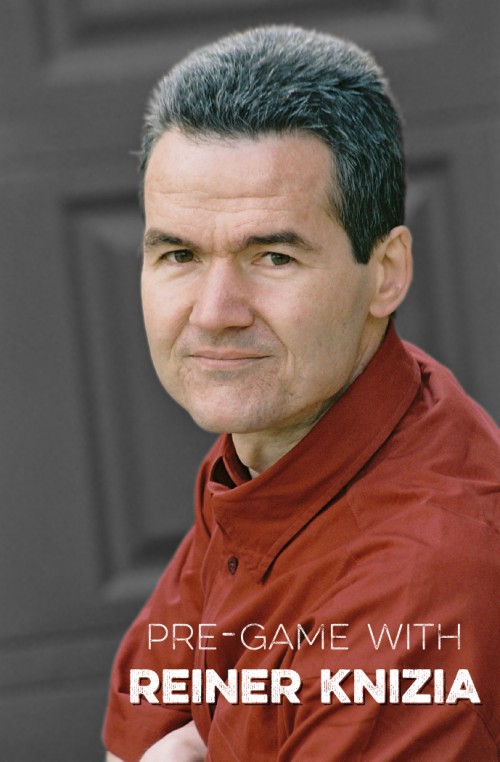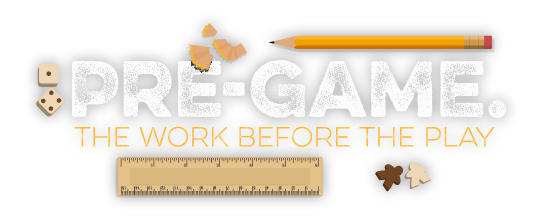
Below is part 2 of the fantastic conversation we had. Check out part 1 if you haven’t already.
Now, more from Reiner Knizia on playtesting, work habits, and breaking into the industry:
This post has affiliate links, which directly support Andhegames.com at no extra cost to you. If you have any questions about anything recommended, let me know. – Andrew
What are some tool/programs/supplies that you wouldn’t work without?
It depends on the design. The most valuable resource is my play testers. I wouldn’t call them tools, but they are the most valuable input in this process. There’s a lot of creativity in this group. There are also two programmers in the group, so whenever we do something which is a hybrid game – partially electronic – we would usually have a PC simulation, which is a 1:1 functionality implementation of the target software. Then we would playtest with someone simulating it manually, so we could test the game on the laptop, and fine-tune things. It is really these people who bring the creativity into the process.
Otherwise, in phase one, the answer to this question is essentially nothing, because it’s just discussion with paper and pencil. In phase two, we have a special printer here in the office so we can print on cardboard and print our cards, and we do the graphics on the laptop, but that’s just normal day-to-day stuff. There’s really nothing specific.
What design-related media do you consume on a regular basis?
I don’t.
I go to the different fairs – to the Nuremburg toy fair and the Essin fair and so on – so I get a lot of impressions and a lot of input from these fairs. When important things come up, my group feeds that into me. This may be disappointing to some journalists and press people, but I have learned that the day-to-day…stuff…has no real longevity and often doesn’t have a big impact on me. It costs me more time then gives me value.
I don’t read any newspapers, I don’t watch any news – the news in the U.K. is terrible. It’s all personal disasters but no world politics, and I don’t think it’s much better in America. When I want to read more substantial stuff, I pick the right books, or at good documentaries. I also listen to a lot of books.
I have the more long-term approach: I look at things that have been worked through throughly that can give me a good background rather than the day-to-day stuff, which today is overflowing: it’s very difficult to sort the trivialities from the very good blogs.
What’s your playtesting philosophy? How often/early do you playtest?
We play every day, usually in the evenings, because the playtesters have decent jobs during the day. They’re regular groups who I see once a week, so I have a Tuesday group, a Wednesday group, a Sunday afternoon group, and so on.
One of the core challenges in designing is to not get too close to it and develop a conventional way to play it, but to make the game robust, so when the game is out in the world people can approach it from many different angles and it still works. Therefore, I think it’s important to play it with many different test groups.
I also try to stand back a little bit and see how the game develops: I could influence the game and always pull it in one direction, but that’s very counter-productive. When we test, we need to be very hard on the game, so that it develops this robustness.
There are usually 3-5 games which are very intensively tested, and they come to the table every day. I mentioned sixty drawers, and there are probably at the moment forty games, but not all of them are active. If I can’t play it once a week, the design is paused, because I can kid myself and say “I’m working on all of these”, but I can’t work on all of them, it’s impossible. But as one game is completed, others come in. It’s a natural selection process – the games that seem most promising, with the most potential, of course would be in the foreground, and would be played. This helps me avoid the risk of hanging onto a design I love even though it’s already dead.
What are some of the biggest obstacles you’ve faced in your work, and how have you overcome them?
I think I’ve been lucky. My game design career has gone very smoothly. I have designed games since I was 8-10 years old. I only started marketing and publishing these in my late 20s. I had a very rich source of designs, which I developed just because I loved designing and playing games: the publication was not the important thing to me initially.
I was very lucky when I started to publish – I found two publishers right away, one who wanted to publish one of my designs, and at the same time another who wanted to publish a book of my new designs. I was lucky enough after a few years to win the German Game award for Modern Art, which pushed me forward. I think I haven’t had any obstacles in my way that were overwhelming, because I’ve always seen my game designs as a hobby – I didn’t count them as work. I’ve found plenty of publishers, particularly because I decided early on that I would go worldwide, and not just concentrate on one market.
All the different cultures in the world have always been a fascinating thing for me: you get to know lots of people, and lots of different countries.
In this respect, I think I was very lucky, but I you might also say that the harder I work, the luckier I get. I worked very hard on things, but as I said, it wasn’t work for me. I think if you’re a new designer, it’s a tough world out there. The relationship between the publishers and the designers isn’t as friendly and driven by friendship as it used to be.
It’s tough today, but I also find it exciting to see how the world changes so quickly, because if you want to be innovative, then nothing is worse than a standstill. But if everything changes around you, then it’s easy to pick up new opportunities.
It’s a long process, though – I did my first fifteen years of game design without ever trying to do business, so I had a lot of background. But if you want to start right away, it’s a big challenge.
How do you handle life/family/work balance?
I handle it very simply: I have no kids, and I’m not married. My games are my kids – it’s a bit extreme, but a lot of my time is dedicated to my games. I’ve streamlined my life quite considerably. I don’t have to do the garden – I have a gardener, I have someone who looks after the maintenance of the office, I have my assistant who does much of the operational things, so I think from learning how to organize big businesses, I have organized myself so that I can concentrate on those things that I do best.
I don’t always work, but I get up very early in the morning – 4:00, 5:00 – this gives me a head-start, and that’s when my work is the strongest, and we test in the evenings. Much of the inout into my life comes from the business, but it’s not all design. If you want to be a good designer, you need to understand the production processes, you need to have the connections world-wide to serve and understand all of the markets, so I have a lot of friends all over the world, and I see them a lot because of my business travel. I find that my focus on games makes my life very rich, and it’s very enriching.
How many hours/week do you generally devote to game design? How many to other business-related activities?
That’s a difficult question, because it depends on what I’m doing. The ratio can be, for some weeks, almost 100% on operational things, and on other weeks it would be almost 80% on design. It varies a lot, which is nice and refreshing.
What’s the best advice about life that you’ve ever received?
That’s a powerful question. I need a good answer for this. I’ll come back to this question, let’s do the next one first.
What one piece of advice would you give aspiring game designers?
Get a good overview of what’s out there: what games are there, what publishers are there, what the publishers are doing, and then – work with small publishers.
If you want to start with the big publishers, it’s hopeless. Even for the very established authors, it’s very difficult to have a very fruitful relationship, and to get good input and output there. When you work with small publishers, you’re much closer to the business, because there’s a lot to learn, and you will get all of the feedback and all of the input through each stage of the design and production process. It’s a much more personally rewarding situation, and you’re really involved.
You won’t sell your first design to a big publisher – the probability is virtually nil – and even if you are lucky enough to sell it, you’re completely out of the process. You won’t learn anything.
Also, don’t be too worried about getting your design stolen, there are a lot of honest people in the world, and you can trust them.
Who would you like to see answer these questions?
There are two designers I would be very interested in hearing the answers, but you will will not be able to get them. Sid Sackson and Alex Randolph – I knew Alex Randolph very well, so I would know many of his answers. But as for the old masters of game design, they have a lot to teach us, and to get the answers from them, we need to look into their books.
We still have one question open, yes?
What’s the best advice about life that you’ve ever received?
I’m not sure if I would say that this was the best advice that I’ve ever received, but one of the strongest experiences I have made is if something bad happens to you, have the ambition to say “I will turn this around, I will turn this situation into something that in hindsight will be one of the best things that ever happened to me”. It’s like the frog in the water: when you get thrown in a very hot water, you jump out, and you get to look back and say “now I’m in a better situation”.
It makes you very robust and resilient, because when you go through this a number of times in your life, You learn that yes, you can do this again. It makes you more optimistic, and less fearful of what might happen.



[…] Read part 2 here! […]
[…] How Reiner Knizia Makes Games (Part 2) […]
Thanks for your insights!
Good interview and interesting answers.
[…] You might be interested in learning how Reiner Knizia makes games. […]
This interview is a great opportunity to get to know Mr. Knizia, the master of board games. I have one objection to the interview. It is definitely too short 🙂